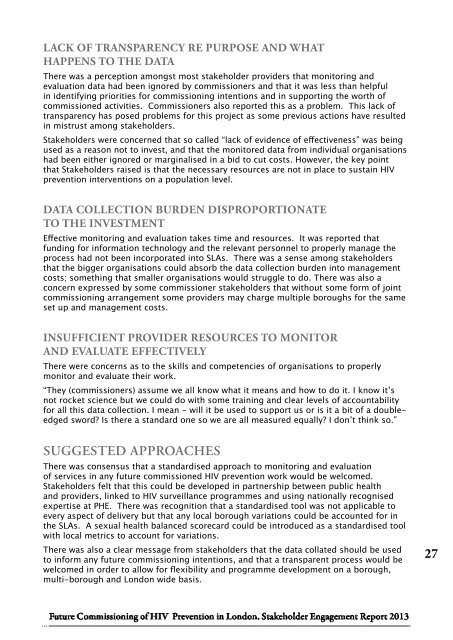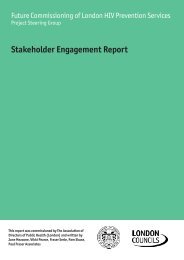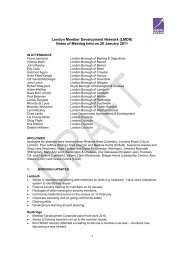Stakeholder Engagement Report - London Councils
Stakeholder Engagement Report - London Councils
Stakeholder Engagement Report - London Councils
Create successful ePaper yourself
Turn your PDF publications into a flip-book with our unique Google optimized e-Paper software.
Lack of transparency re purpose and what<br />
happens to the data<br />
There was a perception amongst most stakeholder providers that monitoring and<br />
evaluation data had been ignored by commissioners and that it was less than helpful<br />
in identifying priorities for commissioning intentions and in supporting the worth of<br />
commissioned activities. Commissioners also reported this as a problem. This lack of<br />
transparency has posed problems for this project as some previous actions have resulted<br />
in mistrust among stakeholders.<br />
<strong>Stakeholder</strong>s were concerned that so called “lack of evidence of effectiveness” was being<br />
used as a reason not to invest, and that the monitored data from individual organisations<br />
had been either ignored or marginalised in a bid to cut costs. However, the key point<br />
that <strong>Stakeholder</strong>s raised is that the necessary resources are not in place to sustain HIV<br />
prevention interventions on a population level.<br />
Data collection burden disproportionate<br />
to the investment<br />
Effective monitoring and evaluation takes time and resources. It was reported that<br />
funding for information technology and the relevant personnel to properly manage the<br />
process had not been incorporated into SLAs. There was a sense among stakeholders<br />
that the bigger organisations could absorb the data collection burden into management<br />
costs; something that smaller organisations would struggle to do. There was also a<br />
concern expressed by some commissioner stakeholders that without some form of joint<br />
commissioning arrangement some providers may charge multiple boroughs for the same<br />
set up and management costs.<br />
Insufficient provider resources to monitor<br />
and evaluate effectively<br />
There were concerns as to the skills and competencies of organisations to properly<br />
monitor and evaluate their work.<br />
“They (commissioners) assume we all know what it means and how to do it. I know it’s<br />
not rocket science but we could do with some training and clear levels of accountability<br />
for all this data collection. I mean - will it be used to support us or is it a bit of a doubleedged<br />
sword? Is there a standard one so we are all measured equally? I don’t think so.”<br />
Suggested approaches<br />
There was consensus that a standardised approach to monitoring and evaluation<br />
of services in any future commissioned HIV prevention work would be welcomed.<br />
<strong>Stakeholder</strong>s felt that this could be developed in partnership between public health<br />
and providers, linked to HIV surveillance programmes and using nationally recognised<br />
expertise at PHE. There was recognition that a standardised tool was not applicable to<br />
every aspect of delivery but that any local borough variations could be accounted for in<br />
the SLAs. A sexual health balanced scorecard could be introduced as a standardised tool<br />
with local metrics to account for variations.<br />
There was also a clear message from stakeholders that the data collated should be used<br />
to inform any future commissioning intentions, and that a transparent process would be<br />
welcomed in order to allow for flexibility and programme development on a borough,<br />
multi-borough and <strong>London</strong> wide basis.<br />
27




